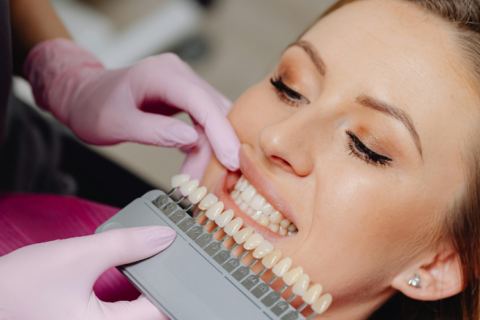Why You Get Sensitive Teeth After Whitening — And How to Find Relief
Teeth whitening is one of the most popular cosmetic dental treatments today — and for good reason. It’s fast, affordable, and can make a big difference in your smile. However, some patients experience sensitive teeth after whitening, which can make the process uncomfortable. At McKinley Family Dental in Mishawaka, IN, we want to help you understand why this happens and what you can do to manage it safely.
The Purpose of Teeth Whitening
The goal of teeth whitening is to remove stains and discoloration from the tooth’s surface or deep within the enamel. Whether done in-office or at home, whitening products typically contain hydrogen peroxide or carbamide peroxide — active ingredients that penetrate the enamel and break up stains.
While effective, these ingredients can temporarily open up microscopic pores in your teeth, leading to increased sensitivity, especially to temperature and pressure.
What Causes Tooth Sensitivity After Whitening?
If you’re dealing with sensitive teeth after whitening, you’re not alone. This is a common side effect, and it usually goes away within a few days. The sensitivity occurs because:
- The whitening agents reach the dentin, the inner layer of the tooth, which is rich in nerve endings.
- Dehydration of the enamel during the whitening process exposes nerve endings to stimuli.
- Existing dental conditions like receding gums or enamel erosion can make sensitivity worse.
Post-Whitening Care Tips to Get Rid of Teeth Sensitivity
Here are several proven ways to relieve discomfort from sensitive teeth after whitening:
1. Use Desensitizing Toothpaste
Toothpastes designed for sensitive teeth contain ingredients like potassium nitrate or stannous fluoride that block pain signals from reaching the nerves. Use these daily before and after whitening.
2. Avoid Hot or Cold Foods and Drinks
Stick to lukewarm or room-temperature items for a few days after whitening. Hot coffee or cold ice cream can trigger sharp pain if your teeth are sensitive.
3. Limit Acidic and Sugary Foods
Foods like citrus fruits, soda, and candy can weaken enamel and worsen sensitivity. Stick to a bland diet for the first 48 hours after whitening.
4. Switch to a Soft-Bristled Toothbrush
A soft-bristled toothbrush is gentler on your enamel and gums. It helps reduce irritation and allows your teeth to recover faster from sensitivity.
5. Take Breaks Between Whitening Sessions
If you’re using at-home trays or strips, try spacing out your treatments. Whitening every other day instead of daily can reduce sensitivity while still producing great results.
6. Apply Fluoride Treatments
Ask your dentist about a fluoride gel or rinse to strengthen enamel and reduce nerve sensitivity. These can often be applied in-office or prescribed for home use.
Conclusion
Sensitive teeth after whitening are common, but they don’t have to keep you from achieving a brighter smile. With proper care and guidance from your dental team, you can minimize discomfort and enjoy long-lasting whitening results. At McKinley Family Dental, we’re here to help you whiten your teeth safely and comfortably.
Call today to schedule your appointment and let us help you manage sensitivity with a personalized approach that fits your smile goals.
Frequently Asked Questions
- How long does tooth sensitivity last after whitening?
Sensitivity after whitening usually lasts between 24 to 72 hours. In most cases, it subsides on its own, especially if you follow post-whitening care instructions. If sensitivity persists beyond a few days, it’s best to contact your dentist to rule out any underlying issues. - Is tooth sensitivity after whitening a sign of damage?
Not necessarily. Temporary sensitivity is a common and expected side effect of whitening and typically doesn’t indicate permanent damage. However, if your teeth already have thin enamel or exposed roots, the whitening process can exacerbate discomfort. A dentist can help determine if whitening is safe for you. - Can I prevent sensitivity before whitening my teeth?
Yes. Using a desensitizing toothpaste for at least two weeks before your whitening treatment can help. You can also talk to your dentist about applying a fluoride gel or desensitizing agent before the procedure to reduce the risk of sensitivity. - Should I stop whitening if my teeth become sensitive?
If you experience significant discomfort, it’s a good idea to pause your whitening routine and consult your dentist. In many cases, spacing out treatments or switching to a lower-concentration product can allow you to continue whitening safely. - Are in-office whitening treatments less likely to cause sensitivity?
In-office treatments at McKinley Family Dental are professionally monitored and often use desensitizing agents during the process. This can reduce the risk of post-treatment sensitivity compared to over-the-counter products, especially for patients with existing dental sensitivity.


